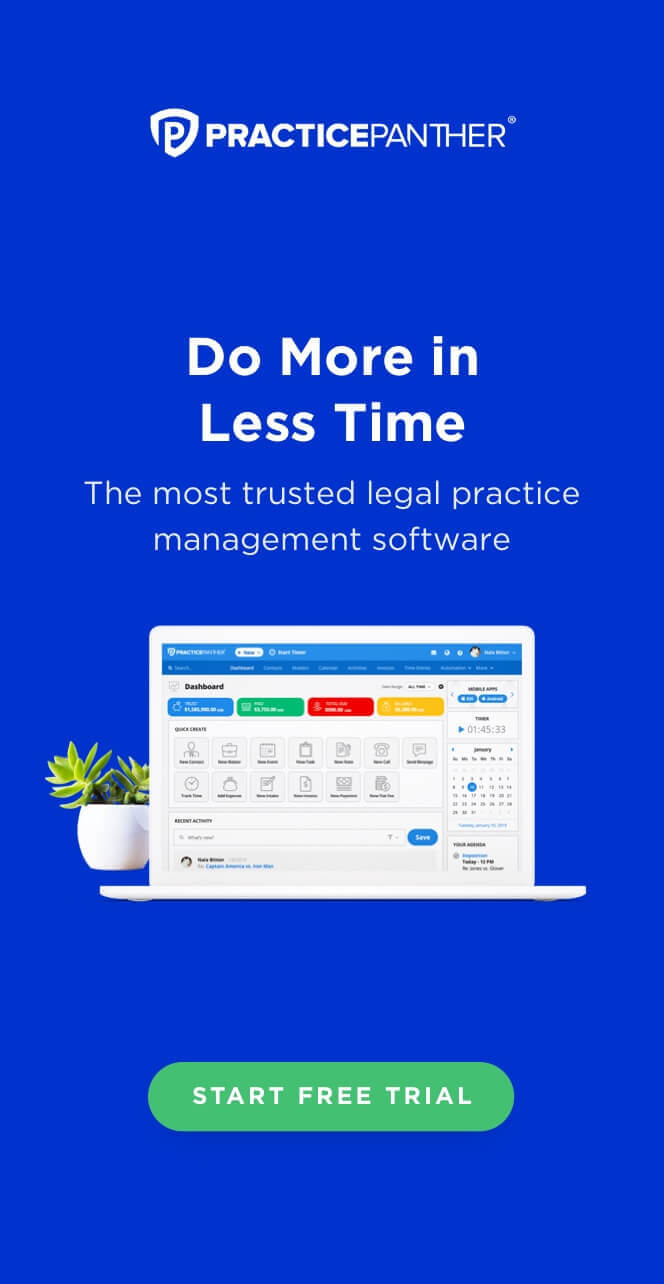In today’s fast-paced and socially conscious world, giving back to the community has gained substantial importance. Pro bono work has emerged as a powerful tool for attorneys to make a positive impact, improve personal and professional growth, enhance credibility, and increase community engagement.
Pro bono work comes with a responsibility to track the services provided. Learn more about the advantages of tracking your pro bono work.
What Is Pro Bono Work?
Pro bono work refers to providing legal services, skills, or expertise without charging a fee or a reduced fee. The term “pro bono” is derived from the Latin phrase “pro bono publico,” which translates to “for the public good.”
In essence, pro bono work involves volunteering your time, knowledge, or talents to assist individuals, organizations, or causes that may not have the financial means to access your services otherwise.
Pro Bono vs. Billable Work
Legal pro bono and billable work are two distinct categories of legal services you can provide, each with its own purpose, approach, and compensation structure.
Difference in Services
The primary goal of pro bono work is to promote access to justice and assist underserved populations. You engage in pro bono work out of a sense of social responsibility, a commitment to help those in need, and a desire to contribute positively to their communities. It also allows you to build your presence within your community, strengthen your expertise, and operate as a marketing strategy for your firm.
Billable work aims to provide legal representation and counsel to your clients while generating revenue for your law firm. You engage in billable work to maintain the financial sustainability of your practice.
Who Is It For?
Pro bono work benefits individuals, groups, and causes that may lack the financial means to access legal services. Recipients of pro bono work can include:
- Underserved Communities
- Non-profit Organizations
- Marginalized or vulnerable Individuals
- Startups and small businesses
- Educational institutions or students
- Community projects
- Environmental and humanitarian causes
- Social enterprises
- Legal aid clinics
The scope of recipients for pro bono work is vast, encompassing a broad spectrum of needs and causes. Ultimately, pro bono work seeks to bridge gaps and address societal inequalities.
When Is It Needed?
In essence, legal pro bono work is needed whenever there is an inequality in access to legal services, and justice is at risk of being denied due to financial limitations. For instance, you can help navigate immigration laws, advocate for fair treatment, and prevent deportations for noncitizens.
As a pro bono lawyer, you can provide essential support for non-profit organizations and small businesses with issues related to governance, compliance, contracts, and more. Or represent an individual facing discrimination or civil rights violations to uphold their rights.
The idea is to provide pro bono work whenever there is unequal access to legal services and a threat to equal justice.
What Are the Benefits of Pro Bono Work?
When most people hear “pro bono work,” the idea of serving the community is closely associated. While this is certainly a primary objective, there are other benefits pro bono work provides.
Gain Experience
When you provide pro bono work, you are provided with practical experience that might not be available in a typical work environment. Pro bono work creates an environment for you to broaden your skill sets and learn through real-world challenges. This is particularly beneficial for law students or new practicing attorneys.
Boost Professional Image
Practicing pro bono work allows you to develop a unique brand identity based on your commitment to social impact when the work aligns with your personal and organizational values. Successful pro bono projects can garner positive testimonials and word-of-mouth referrals, contributing to your reputation and professional image.
Expand Your Network
Participating in pro bono work presents an opportunity to connect with like-minded professionals, organizations, and potential clients. You can expand your professional network and build stronger relationships within your community. Additionally, participating in pro bono work fosters a sense of teamwork among your employees, boosting morale and strengthening your company culture.
How Do Lawyers Track Pro Bono Hours?
Capture the positive impact you make by tracking the hours you spend on pro bono work. Here is a tip on how you can do this.
Use a Time Tracker.
Choose a tracking method, such as using specialized software, spreadsheet applications, or dedicated pro bono tracking platforms provided by bar associations or other legal organizations. Because we live in a technological age, legal practice management software enables you to track your pro bono hours.
A great resource available is PracticePanther’s legal case management software which allows you to track your time with multiple timers. Their tool will enable you to streamline the process and make it easier to generate reports and documentation.
The Importance of Tracking Pro Bono Case Hours
Tracking pro bono case hours is essential for several reasons that contribute to accountability, reporting, personal development, and the overall impact of your pro bono work. Tracking your pro bono case hours:
- Ensures transparency in allocating time and resources, creating professional accountability.
- Helps you meet professional obligations, such as the ABA’s recommended 50 hours of pro bono services yearly.
- Serves as evidence of your commitment to serve your community and can be used for awards, recognition, and membership in honor societies.
- Evaluate your impact on individuals’ lives and within your community.
- Helps you strategically allocate your resources toward providing pro bono work wisely and proficiently.
- Assists in your ability to reflect on your efforts, experiences, and developed skills contributing to your personal growth and skill enhancement.
- Provides tangible information to help you make informed decisions about the types of pro bono cases you want to take on in the future to align with your interests and areas of expertise.
- Helps you set priorities between using your time and resources doing pro bono work and billable work.
- Enables you to demonstrate your contributions when networking with peers, potential clients, and other legal professionals, which can lead to new opportunities.
- Provides the necessary data to promote advocacy efforts, highlight the importance of legal assistance for underserved communities, and influence policy changes supporting access to justice.
Compensation
Traditionally, pro bono work provides non-monetary compensation, such as personal growth, professional development, community engagement, and social impact. Albeit, there are instances where pro bono work is completed at a low cost. As a result, pro bono lawyers may be able to obtain compensation upon the completion of cases, so having a detailed tracking of time spent and expenses can be a massive help as it may be required to receive the compensation.
Pro Bono Reporting
Pro bono reporting is a reliable mechanism to collect consistent and accurate data, contributing to evaluating and improving pro bono initiatives. According to the ABA, there are nine states (Florida, Hawaii, Illinois, Indiana, Maryland, Minnesota, Mississippi, Nevada, New Mexico, and New York) where pro bono case tracking is mandated.
An additional 13 states (Arizona, Connecticut, Georgia, Kentucky, Louisiana, Montana, North Carolina, Ohio, Oregon, Tennessee, Texas, Virginia, and Washington) have voluntary reporting systems. The remaining states still need to have mandated or voluntary reporting systems. However, one benefit mandatory reporting creates is “positive peer pressure,” which could change or create new reporting systems.
Start Tracking Your Pro Bono Work
Tracking pro bono case hours is a foundational step in ensuring the effectiveness, impact, and recognition of pro bono work and promoting equal access to justice for all. A reliable legal software case management system must maintain accurate records in an easy-to-use platform. Consider using PracticePanther to house your pro bono records and data. Their system streamlines and automates processes, allowing you to be free to create a lasting community impact that is personally rewarding.






